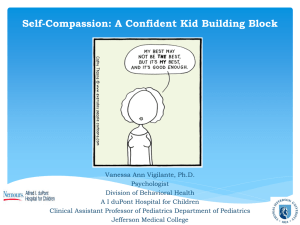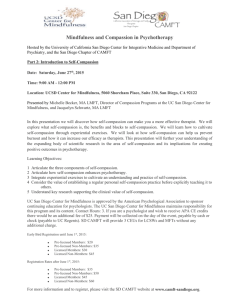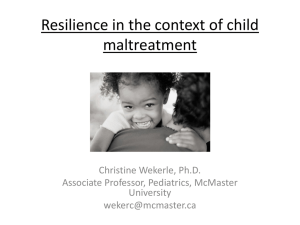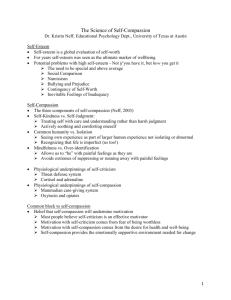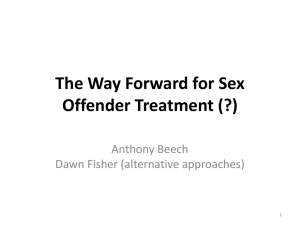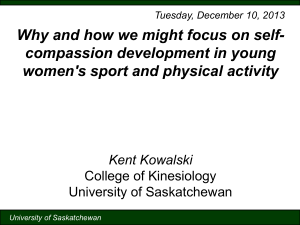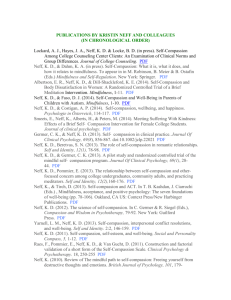Self-Compassion, Wellbeing, and Happiness
advertisement
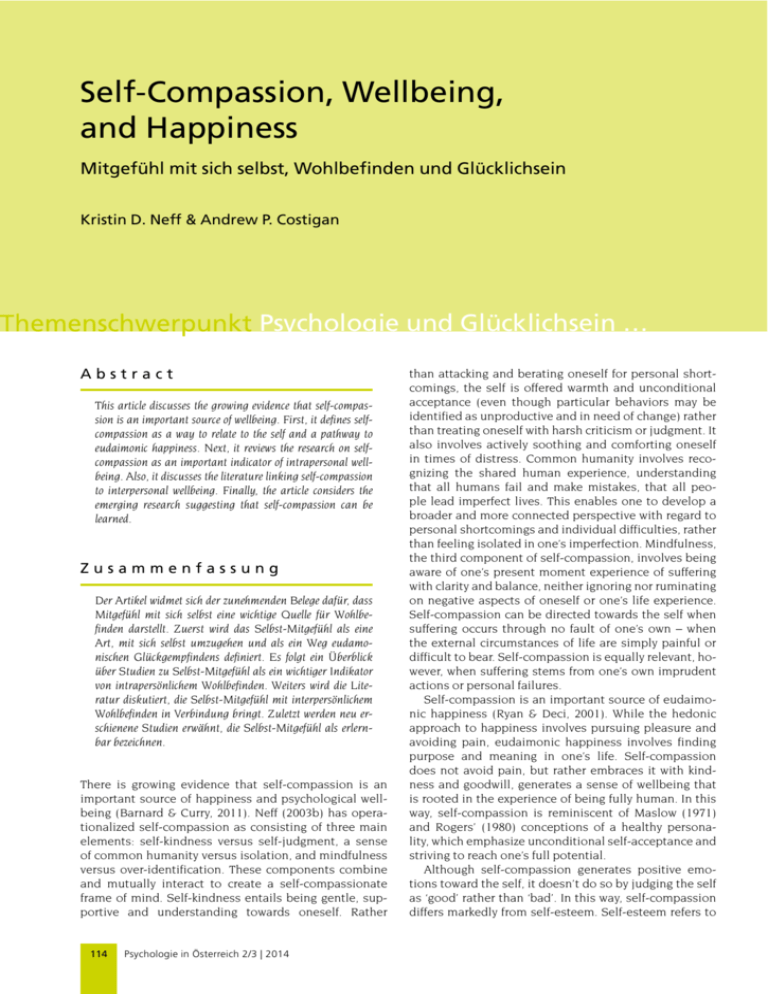
Self-Compassion, Wellbeing, and Happiness Mitgefühl mit sich selbst, Wohlbefinden und Glücklichsein Kristin D. Neff & Andrew P. Costigan Psychologie und Glücklichsein … Abstract This article discusses the growing evidence that self-compassion is an important source of wellbeing. First, it defines selfcompassion as a way to relate to the self and a pathway to eudaimonic happiness. Next, it reviews the research on selfcompassion as an important indicator of intrapersonal wellbeing. Also, it discusses the literature linking self-compassion to interpersonal wellbeing. Finally, the article considers the emerging research suggesting that self-compassion can be learned. Zusammenfassung Der Artikel widmet sich der zunehmenden Belege dafür, dass Mitgefühl mit sich selbst eine wichtige Quelle für Wohlbefinden darstellt. Zuerst wird das Selbst-Mitgefühl als eine Art, mit sich selbst umzugehen und als ein Weg eudamonischen Glückgempfindens definiert. Es folgt ein Überblick über Studien zu Selbst-Mitgefühl als ein wichtiger Indikator von intrapersönlichem Wohlbefinden. Weiters wird die Literatur diskutiert, die Selbst-Mitgefühl mit interpersönlichem Wohlbefinden in Verbindung bringt. Zuletzt werden neu erschienene Studien erwähnt, die Selbst-Mitgefühl als erlernbar bezeichnen. There is growing evidence that self-compassion is an important source of happiness and psychological wellbeing (Barnard & Curry, 2011). Neff (2003b) has operationalized self-compassion as consisting of three main elements: self-kindness versus self-judgment, a sense of common humanity versus isolation, and mindfulness versus over-identification. These components combine and mutually interact to create a self-compassionate frame of mind. Self-kindness entails being gentle, supportive and understanding towards oneself. Rather 114 Psychologie in Österreich 2/3 | 2014 than attacking and berating oneself for personal shortcomings, the self is offered warmth and unconditional acceptance (even though particular behaviors may be identified as unproductive and in need of change) rather than treating oneself with harsh criticism or judgment. It also involves actively soothing and comforting oneself in times of distress. Common humanity involves recognizing the shared human experience, understanding that all humans fail and make mistakes, that all people lead imperfect lives. This enables one to develop a broader and more connected perspective with regard to personal shortcomings and individual difficulties, rather than feeling isolated in one’s imperfection. Mindfulness, the third component of self-compassion, involves being aware of one’s present moment experience of suffering with clarity and balance, neither ignoring nor ruminating on negative aspects of oneself or one’s life experience. Self-compassion can be directed towards the self when suffering occurs through no fault of one’s own – when the external circumstances of life are simply painful or difficult to bear. Self-compassion is equally relevant, however, when suffering stems from one’s own imprudent actions or personal failures. Self-compassion is an important source of eudaimonic happiness (Ryan & Deci, 2001). While the hedonic approach to happiness involves pursuing pleasure and avoiding pain, eudaimonic happiness involves finding purpose and meaning in one’s life. Self-compassion does not avoid pain, but rather embraces it with kindness and goodwill, generates a sense of wellbeing that is rooted in the experience of being fully human. In this way, self-compassion is reminiscent of Maslow (1971) and Rogers’ (1980) conceptions of a healthy personality, which emphasize unconditional self-acceptance and striving to reach one’s full potential. Although self-compassion generates positive emotions toward the self, it doesn’t do so by judging the self as ‘good’ rather than ‘bad’. In this way, self-compassion differs markedly from self-esteem. Self-esteem refers to Kristin D. Neff & Andrew P. Costigan Self-Compassion, Wellbeing, and Happiness the degree to which we evaluate ourselves positively, and it is often based on comparisons with others (Harter, 1999). In American culture, having high self-esteem means standing out in a crowd – being special and above average (Heine, Lehman, Markus, & Kitayama, 1999). There is general consensus that self-esteem is essential for good mental health (Leary, 1999). There are potential problems with the quest for high self-esteem, however (Crocker & Park, 2004). For instance, people often put others down and inflate their own sense of selfworth as a way to feel better about themselves (Tesser, 1999), and may result in narcissism, prejudice, and bullying (Aberson, Healy, & Romero, 2000; Morf & Rhodewalt, 2001; Salmivalli, Kaukiainen, Kaistaniemi, & Lagerspetz, 1999). Self-esteem also tends to be contingent on success in valued life domains (Crocker, Luhtanen, Cooper, & Bouvrette, 2003), and therefore fluctuates according to performance outcomes (Kernis, Paradise, Whitaker, Wheatman, & Goldman, 2000). In contrast, self-compassion is not based on positive judgments or evaluations. It is a way of positively relating to oneself. People experience self-compassion as a result of being flawed human beings, not because they are special or above average. This means that self-compassion offers more emotional stability than self-esteem because it is available in times of failure as well as success. 1. Research on Self-compassion An overwhelming body of research suggests that selfcompassionate individuals suffer less and thrive more (see Barnard & Curry, 2011 for a review). Thus far, the majority of the research examining the link between self-compassion and wellbeing has come in the form of correlational studies using the Self-Compassion Scale (Neff, 2003a), a self-report measure designed measure assesses the different dimensions of self-compassion. Increasingly, however, researchers have begun to use methods like mood inductions (e.g., Breines & Chen, 2012; Leary, Tate, Adams, Allen, & Hancock, 2007); behavioral observations (Sbarra, Smith, & Mehl, 2012) or short-term interventions (e.g., Shapira & Mongrain, 2011) in order to examine the impact of self-compassion on wellbeing. Consistently, research suggests that greater self-compassion is inversely associated with negative states of mind such as depression, anxiety and stress. In fact, a recent meta-analysis (MacBeth & Gumley, 2012) found a large effect size when examining the link between selfcompassion and psychopathology across 20 studies. Of course, a key feature of self-compassion is the lack of self-criticism, and self-criticism is known to be an important predictor of anxiety and depression (Blatt, 1995). However, self-compassion still offers protection against anxiety and depression when controlling for self-criticism and negative affect (Neff, 2003a; Neff, Kirkpatrick & Rude, 2007). Greater self-compassion is also linked with less rumination, perfectionism, and fear of failure (Neff, 2003a; Neff, Hsieh, & Dejitterat, 2005). The resilience self-compassion offers against negative states of mind may be related to the finding that self-compassion tends to decrease cortisol and increase heart-rate variability (associated with the ability to self-soothe when stressed; Rockliff, Gilbert, McEwan, Lightman, & Glover, 2008). Self-compassion appears to facilitate resilience by moderating people’s reactions to negative events. In an elegant series of experimental studies, Leary, Tate, Adams, Allen, and Hancock (2007) asked undergraduates to recall unpleasant events, imagine hypothetical situations about failure, loss, and humiliation, perform an embarrassing task, and disclose personal information to another person who gave them ambivalent feedback. Results indicated that individuals who were high in selfcompassion demonstrated less extreme reactions, less negative emotions, more accepting thoughts, and a greater tendency to put their problems into perspective, while at the same time acknowledging their own responsibility, than individuals who were low in self-compassion. While self-compassion loosens the grip of negativity, it’s important to remember that self-compassion does not eliminate or push away negative emotions altogether. In fact, self-compassionate individuals are less likely to suppress unwanted thoughts and emotions than those who lack self-compassion (Neff, 2003a), and more likely to acknowledge and validate the importance of their emotions (Leary et al, 2007; Neff, Hseih, Dejitterat, 2005; Neff et al., 2007). In one study, for instance, Neff, Kirkpatrick and Rude (2007), gave participants a mock job interview that asked them to ‘describe their greatest weakness’. The results indicated that self-compassionate people used as many negative self-descriptors as those low in self-compassion when describing their weaknesses. However, they were less likely to develop anxiety as a result of the interview. Also, self-compassionate individuals tended to use language that indicated connection rather than isolation when writing about their weakness. For example, they used fewer first person singular pronouns such as ‘I’, in favor of first person plural pronouns such as ‘we’, and making more social references to friends, family, and others. These findings suggests that self-compassion may decrease maladaptive emotional reactions because weaknesses feel less threatening when considered in the light of the shared human experience. Research suggests that self-compassion is associated with a number of positive psychological strengths. For instance, self-compassionate people report feeling more happiness than those who lack self-compassion (Hollis-Walker & Colosimo, 2011; Neff, Rude & Kirkpatrick, 2007; Shapira & Mongrain, 2010; Smeets, Neff, Alberts, & Peters, 2014). They also display higher levels of optimism, gratitude and positive affect more generally (Breen, Kashdan, Lenser, & Fincham, 2010; Neff, Rude & Kirkpatrick, 2007). Self-compassion has also been linked Psychologie in Österreich 2/3 | 2014 115 Kristin D. Neff & Andrew P. Costigan Self-Compassion, Wellbeing, and Happiness to emotional intelligence, wisdom, personal initiative, curiosity, intellectual flexibility, life satisfaction, and feelings of social connectedness – all important components of a meaningful life (Heffernan, Griffin, McNulty, & Fitzpatrick, 2010; Martin, Staggers, & Anderson, 2011; Neff, 2003a; Neff, Pisitsungkagarn, & Hseih, 2008; Neff, Rude & Kirkpatrick, 2007). In addition, self-compassion has been associated with feelings of autonomy, competence, relatedness, and self-determination (Magnus, Kowalski, & McHugh, 2010; Neff, 2003a), suggesting that self-compassion helps meet the basic psychological needs that Ryan and Deci (2001) argue are fundamental to eudaimonic wellbeing. Research suggests that self-compassion is not just a pre-existing personality trait – training in self-compassion can also result in enhanced psychological wellbeing. For instance, Smeets, Neff, Alberts, and Peters (2014) found that three weeks of self-compassion training for college students led to significantly greater increases in optimism and self-efficacy, as well as significantly greater decreases in rumination in comparison to a time management control group. Similarly, Shapira and Mongrain (2010) conducted an experiment in which individuals were asked to write a self-compassionate letter to themselves every day for seven days. They found that the brief intervention decreased depression for three months and increased happiness levels for six months compared to a control group who wrote about early memories. That is the beauty of self-compassion. By wrapping one’s pain in the warm embrace of selfcompassion, positive feelings are generated that help balance the negative ones, allowing for more joyous states of mind. 2. Self-compassion and interpersonal wellbeing In addition to personal happiness, self-compassion appears to increase interpersonal happiness. In a study of heterosexual couples (Neff & Beretvas, 2013), for instance, individuals with greater self-compassion were described by their partners as more emotionally connected, accepting and autonomy-supporting while being less detached, controlling, and verbally or physically aggressive than those lacking self-compassion. Participants with self-compassionate partners also reported being more satisfied in their relationship. Because selfcompassionate people provide themselves care and support, they appear to have more emotional resources available to give to their partners. Research has found that self-compassionate college students tend to have more compassionate goals in relationships with friends and roommates, meaning they tend to provide social support and encourage interpersonal trust with relationship partners (Crocker & Canevello, 2008). Other research (Yarnell & Neff, 2013) has found that self-compassionate individuals are more likely to compromise in 116 Psychologie in Österreich 2/3 | 2014 conflict situations with others, while those lacking selfcompassion tended to subordinate their needs to those of others. This pattern makes sense given that people with high levels of self-compassion say they tend to be equally kind to themselves as others, but people with low levels of self-compassion say they tend to be kinder to others than themselves (Neff, 2003a). The study also showed that self-compassionate people felt more authentic and experienced less turmoil when resolving relationships conflicts, and reported a greater sense of well-being in their relationships. Finally, self-compassion has been associated with the tendency to apologize and repair past relationship harms (Breines & Chen, 2012; Howell, Dopko, Turowski, & Buro, 2011), which also facilitates harmony within relationships. An interesting question is whether or not self-compassionate people are more compassionate towards others than those who lack self-compassion. Some evidence suggests that self-compassion stimulates parts of the brain associated with compassion in general. Using fMRI (functional Magnetic Resonance Imaging) technology, Longe et al. (2010) found that instructing individuals to be self-compassionate simulated neuronal activity similar to what occurs when empathy for others is evoked. This finding suggests the tendency to respond to suffering with caring concern is a process broadly applicable to the self and others. While preliminary findings suggest that self-compassion is linked to compassion for others, research suggests that this link differs somewhat according to age and life experiences. Neff and Pommier (2013) explored the link between self-compassion and other-focused concern among college undergraduates, individuals practicing Buddhist meditation, and an older community sample. In all three groups, self-compassionate people were better able to confront other people’s suffering without feeling overwhelmed with personal distress. In addition, selfcompassion was significantly associated with forgiving others. Self-compassion was significantly but weakly linked to compassion for others, empathetic concern, and altruism among the community and Buddhist samples. This association is probably not as robust as might be expected because of the fact that most people report being much kinder to others than themselves (Neff, 2003a), attenuating the association. Interestingly, there was no link found between self-compassion and otherfocused concern (i.e., compassion, empathetic concern and altruism) among undergraduates. This may be because young adults often struggle to recognize the shared aspects of their life experience, overestimating their distinctiveness from others (Lapsley, FitzGerald, Rice, & Jackson, 1989). Their beliefs about why they are deserving of care and why others are deserving of care are therefore likely to be poorly integrated. The link between self-compassion and other-focused concern was strongest among meditators, which may be the result of practices like loving-kindness meditation that are designed to intentionally cultivate compassion for both self and others (Hofmann, Grossman, & Hinton, 2011). Kristin D. Neff & Andrew P. Costigan Self-Compassion, Wellbeing, and Happiness While people may tend to be more compassionate to others than to themselves, research indicates that selfcompassion is important for being able to sustain the act of caregiving (Shapiro, Brown & Biegel, 2007; Newsome, Waldo & Gruszka, 2012). For instance, Ringenbach (2009) found that self-compassion was associated with less compassion fatigue among counselors. In addition, it was also linked to greater ‘compassion satisfaction’, which is the positive feelings experienced from work that aims to make a difference in the world. Similarly, Barnard and Curry (2012) found that self-compassionate clergy were less likely to suffer from burnout by attending to the needs of their parishioners, and were also more satisfied with their roles in the ministry. Finally, in a study of health care professionals, Shapiro, Astin, Bishop, and Cordova (2005) found that the increased self-compassion stemming from mindfulness training predicted reductions in stress levels. Thus, it appears that providing oneself compassion in challenging circumstances provides the necessary emotional resources needed to care for others. stress, or repeating a set of memorized self-compassion phrases for use in daily life. Throughout the program, interpersonal exercises are used to help generate feelings of common humanity. Home practices are assigned at the end of each session such as writing a compassionate letter to oneself. Participants are asked to do 40 minutes of self-compassion practice each day, which can be a combination of formal and informal practices. A randomized controlled study of the MSC program compared outcomes for a treatment group to those who were randomized to a waitlist control group. (Neff & Germer, 2013). Results indicated that participation in the intervention significantly increased self-compassion, mindfulness, compassion for others, and life satisfaction, while significantly decreasing depression, anxiety, stress, and emotional avoidance. All gains were maintained for up to one year after completion of the program, and in fact life satisfaction significantly increased one year later. This suggests that self-compassion is teachable skill that can enhance one’s life in a meaningful and powerful manner. 3. Self-compassion interventions 4. Conclusion Because self-compassion is so strongly linked to wellbeing, various programs have been created to help people be more compassionate to themselves in daily life. Paul Gilbert (2010) has developed a general therapeutic approach termed Compassion-Focused Therapy (CFT) that helps individuals develop the skills and attributes of a self-compassionate mind, especially when their more habitual form of self-to-self relating involves shame and self-attack. CFT increases awareness and understanding of automatic emotional reactions such as self-criticism that have evolved in humans over time, and how these patterns are often reinforced in early childhood. The key principles of CFT involve motivating people to care for their own wellbeing, to become sensitive to their own needs and distress, and to extend warmth and understanding towards themselves. CFT techniques include mindfulness training, visualizations, compassionate cognitive responding, and engaging in self-compassionate overt behaviors and habits. This program is currently being used to treat eating disorders, addiction, anxiety disorders, psychosis, and other forms of suffering with apparent success (Braehler et al., 2013; Gilbert, 2010; Goss & Allan, 2014; Kelly, Zuroff, Foa & Gilbert, 2010). Kristin Neff and Chris Germer have developed a selfcompassion training program suitable for non-clinical populations called Mindful Self-Compassion (MSC). In this program participants meet for two hours once a week over the course of the eight weeks, also meeting for a half-day of silent meditation. Formal practices are taught such as loving-kindness Meditation (LKM), an ancient Buddhist practice designed to increase good will for oneself and others. Informal practices are taught such as placing one’s hands on one’s heart in times of Research shows that treating oneself with care and compassion is a powerful way to enhance intrapersonal and interpersonal wellbeing. When we are mindful of our suffering and respond with kindness, remembering that suffering is part of the shared human condition, we are able to cope with life’s struggles with greater ease. We create a loving, connected, and balanced state of mind and heart that helps to reduce psychopathology while simultaneously enhancing joy and meaning in life. Selfcompassion is a portable source of friendship and support that is available when we need it most – when we fail, make mistakes, or struggle in life. By combining acceptance of our present moment experience with the compassionate desire to be happy and free from suffering, we maximize our ability to heal and reach our full potential. Fortunately, skills of self- compassion can be learned and maintained over time. This suggests that psychological interventions aimed at enhancing wellbeing should include an explicit focus on developing self- compassion. Psychologie in Österreich 2/3 | 2014 117 Kristin D. Neff & Andrew P. Costigan Self-Compassion, Wellbeing, and Happiness References ABERSON, C. L., HEALY, M. & ROMERO, V. (2000). Ingroup bias and self-esteem: A meta-analysis. Personality & Social Psychology Review, 4, 157-173. BARNARD, L. K. & CURRY, J. F. (2012). The relationship of clergy burnout to self-compassion and other personality dimensions. Pastoral Psychology, 61(2), 149-163. BLATT, S. J. (1995). The destructiveness of perfectionism: Implications for the treatment of depression. American psychologist, 50(12), 1003. BRAEHLER, C., GUMLEY, A., HARPER, J., WALLACE, S., NORRIE, J., & GILBERT, P. (2013). Exploring change processes in compassion focused therapy in psychosis: Results of a feasibility randomized controlled trial. British Journal of Clinical Psychology, 52(2), 199-214. BREEN, W. E., KASHDAN, T. B., LENSER, M. L., FINCHAM, G. D. (2010). Gratitude and forgiveness: Convergence and divergence on self-report and informant ratings. Personality and Individual Differences, 49, 932-937. BREINES, J. G. & CHEN, S. (2012). Self-compassion increases self-improvement motivation. Personality and Social Psychology Bulletin, 38(9), 1133-1143. CROCKER, J. & CANEVELLO, A. (2008). Creating and undermining social support in communal relationships: the role of compassionate and self-image goals. Journal of personality and social psychology, 95(3), 555. CROCKER, J., LUHTANEN, R. K., COOPER, M. L., & BOUVRETTE, S. (2003). Contingencies of self-worth in college students: Theory and measurement. Journal of Personality and Social Psychology, 85, 894908. CROCKER, J. & PARK, L. E. (2004). The costly pursuit of self-esteem. Psychological Bulletin, 130, 392-414. GILBERT, P. (2010). Compassion focused therapy: Distinctive features. New York, NY US: Routledge/Taylor & Francis Group. GOSS, K. & ALLAN, S. (2014). The development and application of compassion-focused therapy for eating disorders (CFT-E). British Journal Of Clinical Psychology, 53(1), 62-77. HARTER, S. (1999). The construction of the self: A developmental perspective. New York: Guilford Press. HEFFERNAN, M., GRIFFIN, M., MCNULTY, S., & FITZPATRICK, J. J. (2010). Self-compassion and emotional intelligence in nurses. International Journal of Nursing Practice, 16, 366-373. HEINE, S. H., LEHMAN, D. R., MARKUS, H. R., & KITAYAMA, S. (1999). Is there a universal need for positive self-regard? Psychological Review, 106, 766-794. HOFMANN, S. G., GROSSMAN, P. & HINTON, D. E. (2011). Lovingkindness and compassion meditation: Potential for psychological interventions. Clinical psychology review, 31(7), 1126-1132. HOLLIS-WALKER, L. & COLOSIMO, K. (2011). Mindfulness, self-compassion, and happiness in non-meditators: A theoretical and empirical examination. Personality and Individual Differences, 50, 222-227. HOWELL, A. J., DOPKO, R. L., TUROWSKI, J. B., & BURO, K. (2011). The disposition to apologize. Personality and Individual Differences, 51(4), 509-514. KELLY, A. C., ZUROFF, D. C., FOA, C. L., & GILBERT, P. (2009). Who benefits from training in self-compassionate self-regulation? A study of smoking reduction. Journal of Social and Clinical Psychology, 29, 727-755. KERNIS, M. H., & PARADISE, A. W., WHITAKER, D. J., WHEATMAN, S. R., & GOLDMAN, B. N. (2000). Master of one’s psychological domain? Not likely if one’s self-esteem is unstable. Personality and Social Psychology Bulletin, 26, 1297-1305. LAPSLEY, D. K., FITZGERALD, D. P., RICE, K. G., & JACKSON, S. (1989). Separation-Individuation and the ‘New Look’ at the Imaginary Audience and Personal Fable A Test of an Integrative Model. Journal of Adolescent Research, 4(4), 483-505. LEARY, M. R. (1999). Making sense of self-esteem. Current Directions in Psychological Science, 8, 32-35. 118 Psychologie in Österreich 2/3 | 2014 LEARY, M. R., TATE, E. B., ADAMS, C. E., BATTS ALLEN, A., & HANCOCK, J. (2007). Self-compassion and reactions to unpleasant self-relevant events: the implications of treating oneself kindly. Journal of personality and social psychology, 92(5), 887. LONGE, O., MARATOS, F. A., GILBERT, P., EVANS, G., VOLKER, F., ROCKLIFF, H., & RIPPON, G. (2010). Having a word with yourself: Neural correlates of self-criticism and self-reassurance. Neuroimage, 49(2), 1849-1856. MacBETH, A. & GUMLEY, A. (2012). Exploring compassion: A metaanalysis of the association between self-compassion and psychopathology. Clinical Psychology Review, 32(6), 545-552. MAGNUS, C., KOWALSKI, K., & McHUGH, T. (2010). The role of selfcompassion in women’s self-determined motives to exercise and exercise-related outcomes. Self and Identity, 9, 363-382. MARTIN, M. M., STAGGERS, S. M., & ANDERSON, C. M. (2011). The relationships between cognitive flexibility with dogmatism, intellectual flexibility, preference for consistency, and self-compassion, Communication Research Reports, 28, 275-280 MASLOW, A. H. (1971). The farther reaches of human nature. New York: Viking. MORF, C. C. & RHODEWALT, F. (2001). Unraveling the paradoxes of narcissism: A dynamic self-regulatory processing model. Psychological Inquiry, 12, 177-196. NEWSOME, S., WALDO, M., & GRUSZKA, C. (2012). Mindfulness group work: Preventing stress and increasing self-compassion among helping professionals in training. The Journal for Specialists in Group Work, 37(4), 297-311. NEFF, K. D. (2003a). The development and validation of a scale to measure self-compassion. Self and Identity, 2(3), 223-250. NEFF, K. (2003b). Self-compassion: An alternative conceptualization of a healthy attitude toward oneself. Self and identity, 2(2), 85-101. Neff, K. D. & BERETVAS, S. N. (2013). The role of self-compassion in romantic relationships. Self and Identity, 12(1), 78-98. NEFF, K. D., HSIEH, Y. P., & DEJITTERAT, K. (2005). Self-compassion, achievement goals, and coping with academic failure. Self and Identity, 4(3), 263-287. NEFF, K. D. & GERMER, C. K. (2013). A pilot study and randomized controlled trial of the mindful self-compassion program. Journal Of Clinical Psychology, 69(1), 28-44. NEFF, K. D., KIRKPATRICK, K. & RUDE, S. S. (2007). Self-compassion and its link to adaptive psychological functioning. Journal of Research in Personality, 41, 139-154. NEFF, K. D. & POMMIER, E. (2013). The relationship between self-compassion and other-focused concern among college undergraduates, community adults, and practicing meditators. Self and Identity, 12(2), 160-176. NEFF, K. D., & RUDE, S. S., & KIRKPATRICK, K. (2007). An examination of self-compassion in relation to positive psychological functioning and personality traits. Journal of Research in Personality, 41, 908916. RINGENBACH, R. T. (2009). A comparison between counselors who practice meditation and those who do not on compassion fatigue, compassion satisfaction, burnout and self-compassion (Doctoral dissertation, University of Akron). ROCKLIFF, H., GILBERT, P., MCEWAN, K., LIGHTMAN, S., & GLOVER, D. (2008). A pilot exploration of heart rate variability and salivary cortisol responses to compassion-focsed imagery. Clinical Neuropsychiatry, 5, 132-139. ROGERS, C. R. (1980). A way of being. Boston: Houghton Mifflin. RYAN, R. M. & DECI, E. L. (2001). On happiness and human potentials: A review of research on hedonic and eudaimonic well-being. Annual review of psychology, 52(1), 141-166. SALMIVALLI, C., KAUKIAINEN, A., KAISTANIEMI, L., & LAGERSPETZ, K. M. J. (1999). Self-evaluated self-esteem, peer-evaluated self-esteem, and defensive egotism as predictors of adolescents’ participation in bullying situations. Personality and Social Psychology Bulletin, 25, 1268-1278. SBARRA, D. A., SMITH, H. L., & MEHL, M. R. (2012). When leaving your ex, love yourself observational ratings of self-compassion predict the course of emotional recovery following marital separation. Psychological science, 23(3), 261-269. Kristin D. Neff & Andrew P. Costigan Self-Compassion, Wellbeing, and Happiness SHAPIRA, L. B. & MONGRAIN, M. (2010). The benefits of self-compassion and optimism exercises for individuals vulnerable to depression. The Journal of Positive Psychology, 5(5), 377-389. SHAPIRO, S. L., ASTIN, J. A., BISHOP, S. R., & CORDOVA, M. (2005). Mindfulness-based stress reduction for health care professionals: results from a randomized trial. International Journal of Stress Management, 12(2), 164. SHAPIRO, S. L., BROWN, K. W., & BIEGEL, G. M. (2007). Teaching selfcare to caregivers: effects of mindfulness-based stress reduction on the mental health of therapists in training. Training and Education in Professional Psychology, 1(2), 105. SMEETS. E., NEFF, K. D., ALBERTS, H., & PETERS, M. (2014). Meeting suffering with kindness: Effects of a brief self-compassion intervention for female college students. Journal of Clinical Psychology. DOI: 10.1002/jclp.22076 TESSER, A. (1999). Toward a self-evaluation maintenance model of social behavior. In R. F. Baumeister (Ed.) The self in social psychology (pp. 446-460). New York: Psychology Press. YARNELL, L. M. & NEFF, K. D. (2013). Self-compassion, interpersonal conflict resolutions, and well-being. Self and Identity, 12(2), 146-159. Authors Kristin Neff, PhD Kristin Neff is currently an Associate Professor in the Educational Psychology department at the University of Texas at Austin. She is a pioneer in the field of self-compassion research, conducting the first empirical studies on self-compassion over a decade ago. In addition to writing numerous academic articles and book chapters on the topic, she is author of the book ‘Self-Compassion: The proven power of being kind to yourself.’ In conjunction with her colleague Dr. Chris Germer, she has developed an eight-week training program called Mindful Self-Compassion, and offers workshops on selfcompassion worldwide. Kristin is also featured in the bestselling book and award-winning documentary ‘The Horse Boy’, which chronicles her family’s journey to Mongolia where they trekked on horseback to find healing for her autistic son. Educational Psychology The University of Texas at Austin 1 University Station D5800 Austin, TX 78712 USA Andrew P. Costigan Andrew Costigan is a fourth year doctoral student in the Educational Psychology department at the University of Texas in Austin. Since receiving a B.A. in English at Vassar College in 2002, he has worked with students who are dyslexic in the capacity of a language therapist, literature and history teacher, tutor, and educational consultant. His research interest involves the experience of being dyslexic and its impact on one’s wellbeing. More specifically, he is interested in how teaching self-compassion may reduce the academic, social, and emotional challenges learners with dyslexia tend to experience. Educational Psychology The University of Texas at Austin 1 University Station D5800 Austin, TX 78712 USA Psychologie in Österreich 2/3 | 2014 119
